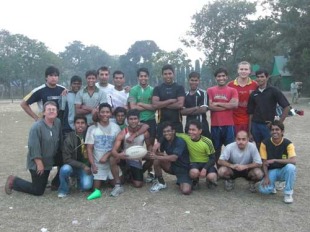|
Kolkata Jungle Crows
Indian rugby has capacity to inspire
Huw Turner
February 1, 2010

The Jungle Crows following training at the end of January 2010
© Huw Turner
Enlarge
Sandwiched between the intimidating lighting towers of Eden Gardens, one of those soaring concrete cathedrals dedicated to the worship of Indian cricket, and the chaotic cacophony that is Indian traffic, the Kolkata Jungle Crows rugby club is one of the most extraordinary I have ever come across. And the most inspiring. To place the Jungle Crows into any sort of context it is necessary to have a wider understanding of India's second largest city, and the pressures exerted on it by the millions of refugees who fled there, either in the wake of partition in 1947 or of the Indo-Pakistan War of 1971. In marvelling at the heroic efforts that are being made by the club's leaders to serve their community, in particular boys and girls largely deprived of any recreational sporting opportunities, you can't help feeling shamed by the ego-driven, materialistic excesses of the professional game in both of the world's hemispheres. The club was founded by Paul Walsh in 2004. Employed at the British High Commission, and in need of a game of rugby, he got together with some mates to make it happen. My host at the end of January, Zaffar Khan, a 24-year-old of Afghan parentage, is now employed by the Crows on their Khelo programme. "Six years back I was driving past the Maidan [the huge park in the city where countless games of cricket seem to go on day and night] when I saw some foreigners playing with an unusual shape ball and I joined them and enjoyed the game and have been part of the club ever since," he said. The Jungle Crows launched Khelo Rugby at the end of 2009, a focused community sports programme aimed at disadvantaged and socially excluded children around the city. Along with Sunny Singh, Zaffar is one of the Khelo coaches, taking tag rugby into the slums and communities where any sort of organised sport is absent. "We are not scouting for future players," Zaffar said. "Once a week we organise chances simply for the children to play and enjoy themselves. We play tag rugby because normally boys and girls are not allowed to play sports together in India. But they can play tag and we have had some amazing feedback from parents who have been telling us that they would like their daughters to take part." One of the advantages of tag is that it requires little equipment and can be played on the non-grass surfaces found around Kolkata. The Jungle Crows' playing space is owned by the Indian army. There are many difficulties associated with securing a ground or club, hence my use of the words "playing space". On the day I visited the Jungle Crows a huge throng had assembled in and around the Maidan to honour the passing of local political icon Jyoti Basu. It took a number of phone calls before contact with Zaffar could be made and even then he was not sure if any sort of training was going to be possible, if any of his players would make it through the crowds in time. He need not have worried - early arrivals had already stripped off and prepared themselves for a game of touch. Among the group I met Maxime Augusseau, a gap-year student from Normandy, and star player Sarfraz 'Tiger' Ahmed. 'Tiger' has recently been invited to a Sevens camp preparing for the New Delhi Commonwealth Games later in the year. It was not difficult to see what had appealed to the selectors. Tiger was a natural rugby player with a wonderful appreciation of space and exquisite timing both with his passing and running angles. I shall watch the New Delhi sevens with particular interest. Elsewhere, eight Jungle Crows had recently travelled to New Delhi to represent Bengal in the first national Under 16 Sevens tournament. The Crows were made up of a mixture of former street children and boys from other communities in Kolkata where they coach. The Bengal side advanced as far as the semi-finals of the main cup where they found the opposition too strong. In October 2009 the Jungle Crows won their first Indian National Championship through the senior women's winning in Delhi of the national 10-a-side tournament. Four of their players were then selected for the India Sevens team for a tour of Malaysia: Tapasi, Sutapa, Kalpana and Priyanka. In New Zealand we hear a lot about the grassroots of rugby - those communities where rugby and the rugby club were once the focus - and how the professional era has eroded the community values associated with the game. At the Kolkata Jungle Crows I encountered a club and an organisation truly serving its community and making a difference to the quality of the lives of the boys, girls, men and women lucky enough to be involved with its programmes. Isn't this what sport in general, and rugby in particular, is supposed to be about? © Scrum.com
|
Live Sports
Communication error please reload the page.
-
Football
-
Cricket
-
Rugby
-
- Days
- Hrs
- Mins
- Secs
F1 - Abu Dhabi GP
Abu Dhabi Grand Prix December 11-131. Max Verstappen ()
2. Valtteri Bottas (Mercedes)
3. Lewis Hamilton (Mercedes)
4. Alexander Albon ()
5. Lando Norris ()
6. Carlos Sainz Jr ()
-
ESPNOtherLive >>
Snooker - China Open
Tennis - Miami Open

